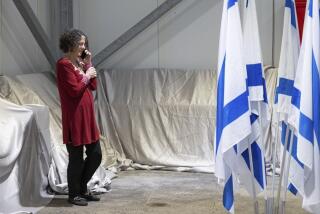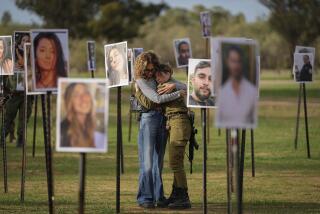305 Fly Home With Mixed Feelings : Hostages: Former ‘guests’ of Iraq land on American soil, some anxious to talk, others bitter or reserved.
CHARLESTON, S.C. — Women and children--and a greater than expected number of men--landed on American soil Sunday, bringing an end to their mixed bag of war stories, clandestine desert treks and, finally, an unhappy deliverance from Iraqi-occupied Kuwait.
Three hundred and five Americans arrived here about 6:15 p.m., becoming the first of the former hostages to leave Kuwait on U.S.-chartered flights that brought Westerners from the war-torn Middle East.
While their stories of fear and near misses preceded them to the United States, many of the returning Americans were reluctant to talk with reporters about their experiences. Though they were freed by State Department officials to say whatever they pleased after clearing the airport customs checkpoint, most quickly brushed past a corridor of reporters without comment.
However, some of the returnees were anxious to talk, detailing the horrors they had seen and lived for the last month in Kuwait.
Though many were careful not to draw specific attention to individuals still in Kuwait, they provided additional details about resistance forces operating within the embattled country. They also talked of food shortages, lack of medical facilities and violent acts by Iraqi forces.
Some of the returnees, like Barbara Hoffman of McKinney, Tex., were anxious to talk--or to express anger.
“I had to leave my husband standing alone,” she said, declining to offer her husband’s name or occupation because he remains hiding in Kuwait. “We’d been in hiding for five weeks” before Iraqi officials allowed her to leave, she said.
Hoffman said she was particularly worried about her husband because he is suffering from a heart condition and has no access to medical care.
“You go to a hospital in Kuwait and you might as well be signing your death warrant,” she said. “If you have an illness there, you’re gone.”
She said that she could not explain why the Iraqi forces had not detained her since they had “broken into our apartment building and took every American out of there. For some . . . reason they didn’t take us. I don’t know why; they just missed us.”
Hoffman also had harsh words for Bush Administration officials, who she said did little to help free her husband. She said government officials told her that only women and children were being allowed to leave Kuwait, but there were “about a dozen men” on board the plane that left Kuwait. A relief official in South Carolina said there were about 20 men who arrived on the flight at the Charleston airport.
“I want to call Jesse Jackson and ask him if he’ll come and get my husband out,” Hoffman said. “George Bush isn’t getting him out.”
But Hoffman was the exception. Many of the other returnees praised government officials for their assistance but said embassy personnel seemed to be limited in what they could do.
Pat Nicholson of Boise, Ida., said she was overjoyed to see government officials, who did all they could to make her comfortable after she left Kuwait.
Jimmy Hawkins of Dallas, one of the men on the rescue flight, said he successfully hitchhiked across the desert before making the flight. He said that after the invasion, Iraqi troops broke into his apartment and stole most of his belongings and detained him for awhile. He said he was able to escape by bribing the officials, and last Tuesday he started from Kuwait city, crossing the desert and entering Baghdad on Friday.
Despite his ordeal, Hawkins said he would return to Kuwait if a legitimate government is returned to the nation. “There would have to be some sort of military presence there to stop this from happening again,” he said. “If that were to happen, Americans would be highly regarded by the Kuwaiti people.”
The red, white and blue Northwest Orient 747 jet left Frankfurt, West Germany, Saturday. It was forced to make an unscheduled stop Sunday afternoon in Halifax, Nova Scotia, after one of the women complained of chest pains and three children became ill, said Mike Brennan, a State Department official. None of the ailing passengers were identified.
Brennan said the stricken woman and children were rushed to a Halifax hospital. The children, apparently all from one family, were accompanied by their mother, who also stayed in Canada.
An Iraqi Airways plane picked up the former hostages in Kuwait and flew them to Amman, with a brief stop in Baghdad for Iraqi officials to check exit visas. From Amman, Northwest Airlines carried the Americans to West Germany, on to Nova Scotia and, finally, to Charleston.
More to Read
Sign up for Essential California
The most important California stories and recommendations in your inbox every morning.
You may occasionally receive promotional content from the Los Angeles Times.










